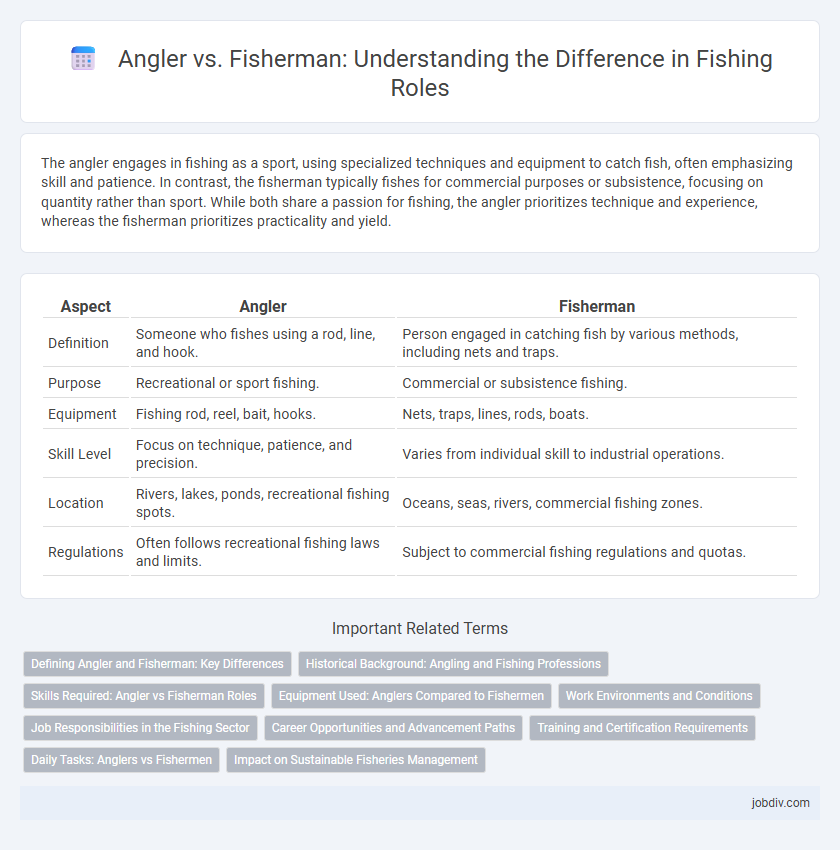The angler engages in fishing as a sport, using specialized techniques and equipment to catch fish, often emphasizing skill and patience. In contrast, the fisherman typically fishes for commercial purposes or subsistence, focusing on quantity rather than sport. While both share a passion for fishing, the angler prioritizes technique and experience, whereas the fisherman prioritizes practicality and yield.
Table of Comparison
| Aspect | Angler | Fisherman |
|---|---|---|
| Definition | Someone who fishes using a rod, line, and hook. | Person engaged in catching fish by various methods, including nets and traps. |
| Purpose | Recreational or sport fishing. | Commercial or subsistence fishing. |
| Equipment | Fishing rod, reel, bait, hooks. | Nets, traps, lines, rods, boats. |
| Skill Level | Focus on technique, patience, and precision. | Varies from individual skill to industrial operations. |
| Location | Rivers, lakes, ponds, recreational fishing spots. | Oceans, seas, rivers, commercial fishing zones. |
| Regulations | Often follows recreational fishing laws and limits. | Subject to commercial fishing regulations and quotas. |
Defining Angler and Fisherman: Key Differences
An angler primarily uses a rod, reel, and bait or lures to catch fish, emphasizing skill and technique in sport or recreation. A fisherman typically engages in fishing for commercial purposes or subsistence, often employing nets, traps, or lines to capture fish on a larger scale. The key difference lies in the method and intent, with anglers focusing on sport and fishermen prioritizing harvest.
Historical Background: Angling and Fishing Professions
The historical distinction between angler and fisherman originates from their differing methods and social perceptions; angling traditionally refers to catching fish with a rod, line, and hook, often for sport or leisure, while fishermen historically engage in commercial or subsistence fishing using nets and traps. Angling dates back to ancient civilizations such as the Egyptians and Romans, where it was associated with elite leisure activities, whereas fishing as a profession evolved with the development of coastal communities relying on fish as a staple food source. Over centuries, these roles expanded, with anglers contributing to recreational fishing cultures and fishermen sustaining global fish industries central to economic and nutritional systems.
Skills Required: Angler vs Fisherman Roles
Anglers require specialized skills such as casting precision, knowledge of fish behavior, and the use of artificial lures to effectively target specific species. Fishermen typically rely on broader techniques including net casting, trap setting, and understanding seasonal fish migration patterns to harvest larger quantities. Mastery of these distinct skills determines the success and role differentiation between anglers and fishermen in fishing practices.
Equipment Used: Anglers Compared to Fishermen
Anglers typically use specialized equipment such as fishing rods, reels, artificial lures, and bait designed for sport fishing, emphasizing precision and technique. Fishermen, on the other hand, often rely on more traditional or commercial gear like nets, traps, and longlines aimed at capturing larger quantities of fish for livelihood. The distinction in equipment reflects the angler's focus on recreation and skill versus the fisherman's focus on productivity and volume.
Work Environments and Conditions
Anglers typically operate in recreational or sport fishing environments, often pursuing fish in lakes, rivers, or coastal waters for leisure under variable weather conditions. Fishermen work in commercial settings, such as fishing vessels or processing plants, facing rigorous labor with exposure to harsh maritime environments, long hours, and safety risks. The work conditions for fishermen demand physical endurance and technical skills to handle heavy equipment and ensure sustainable catches.
Job Responsibilities in the Fishing Sector
Anglers specialize in recreational or sport fishing, often focusing on catching fish using rods, reels, and bait, targeting specific species for personal or competitive purposes. Fishermen engage in commercial fishing, operating nets, traps, or lines on boats to harvest large quantities of fish or seafood for sale and distribution in markets and processing plants. Both roles require knowledge of fish behavior, water ecosystems, and safety regulations, but fishermen rely more on industrial techniques and equipment to maximize catch volume.
Career Opportunities and Advancement Paths
An angler typically focuses on sport fishing and recreational techniques, offering career opportunities in guiding, equipment sales, and tournament organization, while a fisherman often works in commercial fishing, providing paths in boat operation, fish processing, and marine resource management. Advancement for anglers often involves gaining certifications and building reputations in competitive circuits, whereas commercial fishermen can progress to supervisory roles or seafood industry management. Specialized skills in navigation, sustainable fishing practices, and marine regulations significantly impact career growth in both fields.
Training and Certification Requirements
Anglers often undergo specialized training and certification programs focusing on ethical fishing practices, species identification, and sustainable techniques to enhance their skills and environmental stewardship. Fishermen, particularly those engaging in commercial fishing, must meet stringent regulatory requirements, including safety training, navigation certification, and adherence to quotas set by fisheries authorities. Certification standards vary by region but generally emphasize responsible fishing methods to ensure resource conservation and industry compliance.
Daily Tasks: Anglers vs Fishermen
Anglers typically engage in fishing as a recreational activity, using rods and reels to catch fish one at a time, often practicing catch and release to sustain fish populations. Fishermen primarily work in commercial or subsistence fishing, employing nets, traps, or longlines to harvest large quantities of fish for sale or consumption. Daily tasks for anglers involve selecting appropriate bait, casting lines, and monitoring fish behavior, while fishermen handle gear maintenance, boat operation, and sorting catches for market delivery.
Impact on Sustainable Fisheries Management
Anglers contribute to sustainable fisheries management by practicing catch and release, following size and bag limits, and supporting conservation efforts that maintain fish population balance. Fishermen, particularly commercial, impact fish stocks more heavily due to larger harvest volumes but can adopt sustainable techniques like selective gear and quotas to reduce overfishing. Both anglers and fishermen play critical roles in promoting ecosystem health, with effective management relying on cooperation and adherence to science-based regulations.
Angler vs Fisherman Infographic

 jobdiv.com
jobdiv.com